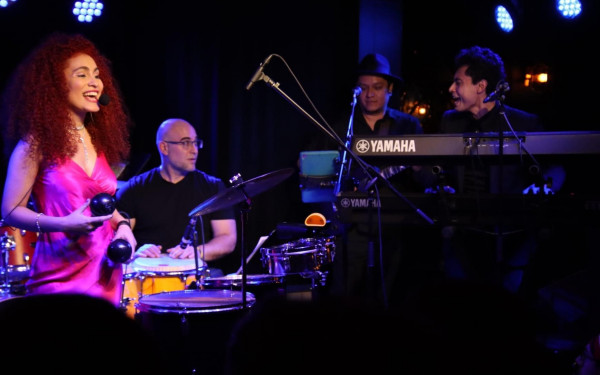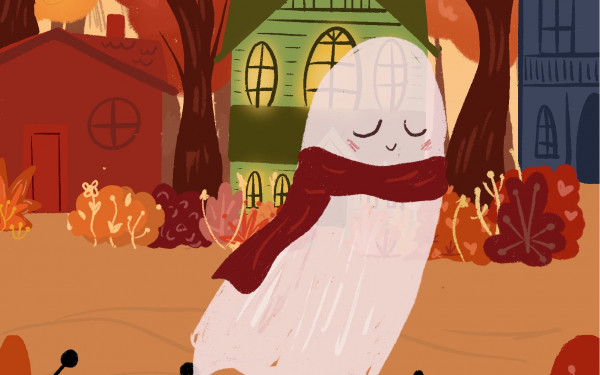MUZ festival brings world music to Montreal’s stage
From Brazilian samba to West African beats, MUZ promises a journey through global rhythms this October
For fans of jazz, world music or contemporary rhythms, this year’s MUZ festival will take you on a journey of meandering soundscapes from Oct. 3 to Oct. 6 at Montreal’s Quartiers des Spectacles.
The festival is presented by Vision Diversité, an organization founded 18 years ago by artistic director Paméla Kamar and her mother, Aida Kamar.
Seventeen years before the organization’s founding, Kamar’s family immigrated to Montreal from Lebanon. Her mother worked with Francophone ministries upon arrival, helping immigrants from all over the world integrate into Quebec society. The mother-daughter duo soon recognized there were many visionary immigrants without opportunities to flourish.
“There were a lot of people who were talented, but there was no place for them,” the younger Kamar said. “We realized that we had a place for that and there was a credibility with our path.”
Kamar and her mother decided to push what she calls “a courant of mixed music” into Montreal’s artistic sphere.
“We decided to start [with] little events,” Kamar added. “We had to do it step by step because everybody wasn't really ready for [mixed music].”
Kamar is driven to help artists find their paths, build their momentum and continue to grow.
“We’ve helped a few hundred artists to take their place [through MUZ],” Kamar said, naming Dominique Fils-Aimé, a Montreal-based singer-songwriter who has won two JUNO awards, among others.

MUZ’s 14th edition will present 17 groups with diverse backgrounds and rich influences. Among the headliners kicking off the festival on Oct. 3 is Maracujá, a four-member ensemble self-described as “the undisputed standard-bearer for Brazilian music in Montreal."
Elie Haroun, Maracujá’s singer, first discovered Brazilian music through the band’s drummer, Sacha Daoud, almost 30 years ago.
“I fell in love with it because it just has a natural happiness to it, from as much the melody standpoint as the rhythm standpoint,” Haroun said. “It's just a type of music that is universally appreciated, universally loved.
Maracujá takes a bossa nova, samba approach to the wide umbrella of Brazilian music.
“[Our music] is very tied to the sound of the ‘60s and ‘70s, but has a very strong prominent jazz influence because of our pianist,” Haroun said. “And it’s never gone out of style.”
Haroun believes that playing in a festival like MUZ, which is specifically created to showcase cross-cultural music, means that Maracujá’s sound is less diluted than in a larger festival like the Montreal International Jazz Festival.
“It gives us a chance to put more value on the kind of music that we do,” Haroun said.
“I really feel like it's a festival that revolves around helping the artists and [...] putting the artists at the forefront,” added Daoud, who has performed at MUZ before as a sideman for other projects.
Another aspect that makes MUZ unique is its short set times of around 20 to 25 minutes, compared to a festival where artists play hour-long sets, according to Daoud.
“You have to bring out the best of what you do and have, that will have the greatest impact,” Daoud said. “It brings another kind of thought process and a way of building your show for that kind of event. And I think the public is lucky because it's [...] able to taste a bit of different artists in one evening.”
“Psychomusical tapas,” Haroun interjected, both he and Daoud laughing.
Maracujá is inspired by traditional Brazilian repertoire, as it is inspired by what Daoud describes as “a great musical diaspora” in Montreal.
“Brazil is such a big country, and there's more than 150 rhythms in Brazil. If somebody comes from southern Brazil, his tradition and his ears are completely attuned in a different way than somebody that comes from the north or Amazonia,” Daoud said. “[It] influences the variety of rhythms and interpretations of Brazilian music that exist.”
Maracujá hopes to embody a sense of pure joy, kinship and communion in their performance on Oct. 3.
“[We have a] sixth sense of how to communicate amongst [each other],” Daoud said. “I think that's always something very strong that transcends the stage and really reaches the public, because I feel like people can really have a very strong sense of that kinship, and [...] it's infectious.”
“If music is not about people,” added Haroun, “if music is not about getting together and having some sort of community together, then I don't know what music is for.”
Haroun and Daoud are excited to see MUZ’s other acts and mingle with people who are in the same vein of music as themselves.
“It's always great to be inspired by other people,” Daoud said.

Among the other artists performing will be Carine au Micro, who will be on stage Oct. 5 for the second time with MUZ—the first being in 2015 at the beginning of her music career.
“I find in this girl a really beautiful voice,” Kamar said, emphasizing her words. “Really, you should hear her.”
Carine au Micro is from Benin, in West Africa. Her roots are integral to her music, manifesting in its rhythms and language.
“We are not that many artists from that part of the world,” she said. “My music is a mix of different styles. It's a mix of gospel—because in gospel, you have a certain strength in the voice. And then I mixed that with jazz, because my parents were very interested in jazz. [...] And then I mixed that with my African origin.”
Carine au Micro’s onstage performance will comprise only four people and two instruments—the acoustic guitar and a traditional African percussion instrument called the calebasse. She will be joined by a deaf artist who will interpret her singing into sign language in real-time.
“It's just a try,” said Carine au Micro, who will be incorporating sign language into her show for the first time. “If it works, I want to keep proposing a show like that. [...] For me, it's important to put different people together.”
MUZ is an immersion of musical worlds, including but not limited to Brazilian music, African music and Carnatic music from southern India, along with instrumentals, guitars, flamenco and ancestral hand percussion. It is a festival founded on rhythmic diversity, blending the modern with the traditional—a true celebration of musical fusion.
“Just during a night, you can do a trip all over the world, but from local artists who are not well known [to] the large public,” Kamar said. “During an evening, you have like six universes. That's what makes the beauty of these evenings.”
This article originally appeared in Volume 45, Issue 3, published October 1, 2024.






_1_600_375_90_s_c1.jpg)
